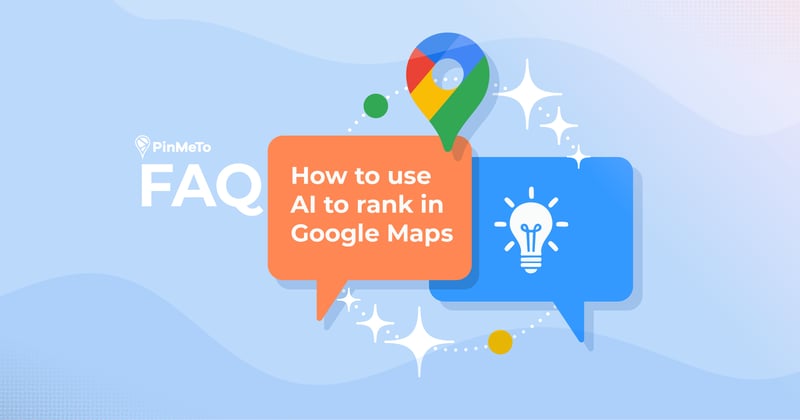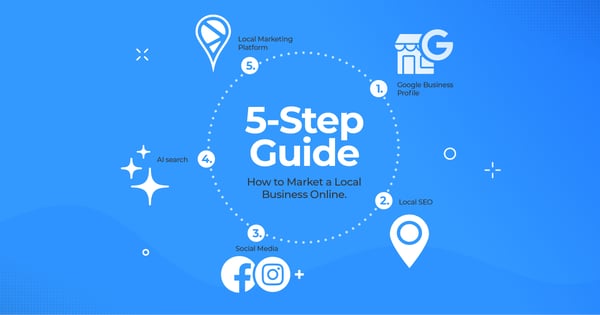As Google continues to enhance its AI Overviews (Search Generative Experience) and integrate machine learning into Maps rankings, local visibility depends more than ever on structured, consistent, and user-focused information.
AI helps you analyze listings, identify optimization opportunities, and strengthen your brand’s presence across Google Maps and local search results. This FAQ guide shows you exactly how.

1. Can AI help my business rank higher on Google Maps?
Yes.
AI tools can analyze your Google Business Profiles (GBPs) to uncover missing data, optimize keywords, and monitor performance. You can use AI to:
- Detect incomplete or inconsistent listings
- Identify location-based keywords and search trends
- Analyze review sentiment and suggest replies
- Predict which locations have the highest visibility potential
For a deeper breakdown of how AI affects ranking visibility, see How to Rank in AI Overviews.
2. What are the main Google Maps ranking factors in 2025?
Google’s local ranking algorithm is built on three core signals:
- Relevance – How closely your profile matches a user’s search intent
- Distance – How close your business is to the searcher’s location
- Prominence – Your reputation and trust signals online (reviews, citations, engagement)
AI strengthens all three by spotting weak signals, improving your listings’ accuracy, and highlighting the content that increases engagement and credibility.
If you want a data-backed view of these trends, check out 30 Local Search Stats Every Multi-Location Brand Should Know.
3. How can AI improve my Google Business Profile?
AI makes optimization faster, smarter, and more precise. Here’s how:
- Data integrity: Find and fix inconsistencies in NAP (Name, Address, Phone) details.
- Keyword discovery: Extract trending local search phrases from reviews and competitor listings.
- Content optimization: Generate draft descriptions, posts, or service details optimized for local intent.
- Photo and attribute suggestions: Recommend visuals and features that drive clicks or calls.
Example: If customers often mention “24/7 service” or “free parking,” AI can suggest adding these to your GBP attributes for higher relevance.
4. How do AI Overviews affect Google Maps visibility?
AI Overviews (formerly SGE) summarize businesses that Google’s systems view as trustworthy and contextually relevant.
To improve your chance of being featured:
- Keep your listings verified and complete across all locations
- Ensure consistent data between your website, listings, and schema markup
- Encourage detailed, authentic reviews using natural local language
- Add structured data (LocalBusiness schema) to help Google understand your business type and location
AI Overviews pull data from your site, your Google Business Profile, and user reviews, so alignment across all three sources increases visibility.
5. Is it safe to use AI-generated text in my listings or website?
Yes, if done responsibly.
Google allows AI-assisted content as long as it’s original, helpful, and accurate.
Use AI to:
- Draft or improve your GBP descriptions and posts
- Generate summaries from real reviews
- Create local FAQs for your website
Avoid:
- Automatically spinning text without review
- Copying competitor content
- Using misleading or irrelevant claims
Always human-check AI content for accuracy, tone, and local authenticity.
6. What data helps AI understand my business better?
AI and search engines rely on structured and verified data to connect users with local results. Focus on:
- Schema markup (LocalBusiness, Product, Review, and FAQ schema)
- Consistent NAP information across all networks and local citations.
- High-quality local photos tagged with relevant context
- Detailed business attributes (services, amenities, accessibility features)
- Active engagement signals (clicks, calls, direction requests, and reviews)
The clearer and more structured your data, the easier it is for AI to match your business to relevant local searches.
7. What AI tools can help improve my Google Maps rankings?
Visibility and performance insights
AI-driven analytics can reveal which locations are most visible in Google Maps, highlight inconsistencies, and suggest where to focus updates. Local marketing platforms like PinMeTo integrate these insights directly with listings management — helping brands detect data gaps, measure impact, and keep business information synchronized across Google, Apple Maps, and other major networks.Reputation intelligence
Understanding how reviews affect rankings is key. Reputation Management Softwares such as PinMeTo Reviews use AI to analyze sentiment, uncover recurring themes, and help teams respond in a consistent, human tone.Content and data structure optimization
Schema markup generators like Google’s Markup Helper make your business easier for AI systems to interpret and connect to your verified listings.
The goal isn’t to rely on one AI tool but to connect the dots between insights, reputation, and accurate data, creating a clear, trustworthy signal that both Google’s algorithms and users can rely on.
8. How can I start using AI to rank in Google Maps?
- Audit your listings: Use AI to detect missing data, duplicates, or inconsistencies.
- Optimize for local search: Add AI-suggested keywords, categories, and attributes.
- Leverage reviews: Use AI to analyze sentiment, highlight local keywords, and draft responses.
- Implement structured data: Add schema markup to reinforce your locations’ relevance.
- Track results: Use tools like PinMeTo to monitor visibility trends and adjust monthly.
AI optimization is an ongoing process: analyze, update, and refine regularly to maintain strong Maps visibility. Dive deeper into more AI SEO hacks here.
To Sum Up
AI is redefining local SEO. When you use AI to rank in Google Maps, you’re enhancing accuracy, relevance, and scalability — the three things Google’s algorithms reward most.
Brands that use AI to unify data, analyze reviews, and automate updates gain consistent visibility across Maps, Search, and AI Overviews.
Looking for ways to level up your local visibility?
Give us an overview of your business below and our experts will schedule a live demo with you.
Lily Adamyan, October 20



